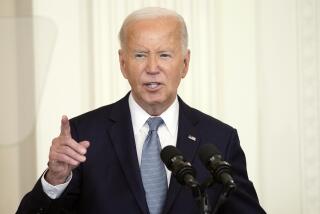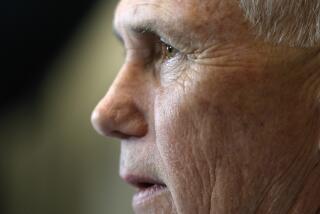COLUMN ONE : Can Quayle Quiet the Whispers? : Washington insiders are playing the rumor game, a pastime they indulge with relish and skill. A victim can end up politically dead; the target this time is the vice president.
- Share via
WASHINGTON — Intrigue: n . a weapon of political combat employing repetition and indirection to achieve ends that cannot be accomplished through open assault. See also innuendo, gossip. See also Dan Quayle.
See Quayle squirm.
It is a technique Washington has employed with relish many times, and now--as panic sets in among the capital’s Republicans--the game is well afoot once more.
The players all know the rules--the wink-and-nod, the flying elbow to the eye when no one else is looking. It can be a calculated effort to inflict damage upon an enemy or--as in this case--primarily a desperate search for a scapegoat.
Regardless, the victim can end up politically dead or disabled with barely a mark on the body.
On Thursday afternoon, President Bush met with a group of GOP senators, and although the ostensible purpose was to discuss efforts to revive the massive superconducting super collider project, before long the discussion turned to Quayle’s future, said sources familiar with the meeting.
No one present advocated dropping the vice president from the ticket, the sources insisted. But word spread quickly that once more the subject had been raised.
In Indiana, where Quayle spent much of the day campaigning, the vice president again faced questions about his future, insisting, as he has in the past, that his presence on the ticket helps Bush because “I have the ability to raise issues” that attract votes.
What started the latest round was Democratic presidential candidate Bill Clinton’s extraordinary week--seven days of soaring polls and a triumphal tour of the American heartland from his well upholstered motor coach. As Clinton rose, political insiders saw an opening to do what many here have long yearned to do for reasons of their own: get Quayle off the Republican ticket.
Accordingly, across the capital, the steady drip, drip of gossip has begun to wear away at the vice president.
“If you want Quayle off the ticket, now is the perfect time to start that stuff,” said a senior aide to one prominent Republican who just might be interested in the job if it were to become vacant. “This is the season, and somebody wants to float the rumor.”
In the present instance, Quayle is the natural target for panicky Republicans who want to do something about the sagging fortunes of their national ticket. The vice president’s negatives are only too real:
After more than three years in the comparatively sheltered environment of the vice president’s office, where he and his aides labored mightily to strengthen his image, Quayle continues to be held in low esteem by most Americans, according to public opinion polls. A Washington Post-ABC News poll this week found that 46% of likely voters surveyed thought Bush should dump Quayle as opposed to 40% who felt Quayle should stay. Only 26% had a favorable image of Quayle as opposed to 63% who view him negatively.
Within the Washington community the feeling that Quayle is a lightweight remains especially strong.
And the vice president himself has repeatedly added self-inflicted wounds with gaffes and miscues that seem to reinforce the old image--most recently his misguided effort to correct a schoolboy on the spelling of the word potato.
The rumor game has been around for generations. But in recent years, both its pace and its aggressiveness have accelerated. “There’s an organized effort to put your spin on the news every day,” said Republican consultant Jay Smith. “It’s different than it was even six or 10 years ago.”
Over the last few years, the game has claimed several prominent figures. Former Texas Sen. John Tower, for example, lost his bid to be secretary of defense in 1989 after repeated rumors about his private conduct. Early this year, the storm over Clinton’s personal life that nearly destroyed him was intensified by unending rumors that worse was still to come. And during the Ronald Reagan Administration, rumor and palace intrigue served as a prime method of operation as senior Reagan aides struggled behind the scenes for influence over their boss.
Now, with many Republicans fearful that the Bush-Quayle ticket could carry them down to disaster, the time-honored dance has begun again.
Wednesday, for example, a senior Pentagon aide casually slipped the words “vice president” and “Dick Cheney” into the same sentence during a conversation with a reporter. The aide insisted when asked that he did not mean to imply that he had any knowledge that his boss, the secretary of defense, might be changing jobs--but he no doubt knew the reporter would repeat the story to someone else.
Senators pass along word of meetings of GOP insiders in which replacing Quayle is high on the agenda, along with demands for the heads of Treasury Secretary Nicholas F. Brady and budget director Richard G. Darman.
Housing Secretary Jack Kemp, one of those sometimes mentioned as a replacement for Quayle, spreads word he is so distressed at the state of affairs that he may skip the GOP convention next month in Houston.
Wednesday night brought the classic next move in the familiar drama: The target of the rumor takes to the airwaves to insist he is happy and secure in his job--usually a sign that neither is true.
In this case, the whispering campaign against Quayle has been intensified by yet another still-unofficial development--that Secretary of State James A. Baker III will return to the White House to take charge of the campaign.
Four years ago, at the GOP convention in New Orleans, Baker made no secret of the fact that he had been left out of the decision to select Quayle even though the Texan was running Bush’s campaign and was considered his closest friend and confidant. Nor was there much doubt that Baker considered the selection misguided.
During the ensuing campaign, Baker imposed tight limits on what Quayle could do or say--a step that Marilyn Quayle recently described in resentful terms in a Washington Post interview. The latest rumbling among insiders is that Baker’s return will enable him to exact his revenge.
As the din has mounted, both the collectors of rumors and those who monger them have begun to watch every nuanced move for signals of whether the game will claim another victim.
And as Quayle has found, once the rumor game puts a person “in play,” few things are more difficult than stopping the cycle. “It can go like a wildfire,” said Democratic consultant Anthony Podesta, who has watched several such rumor storms burn candidates of his party. “An absolute denial only feeds the certainty that it’s true.”
For a campaign caught in the midst of such a storm, there is usually only one way out, said Michael McCurry, another Democratic consultant. “You’ve got to make news,” he said.
“They’ve got to figure out a good, solid way to make news every day that will distract everyone from the rumor story. They’re losing control of the news cycle.”
Thursday, the Republican National Committee tried to regain that control, faxing “talking points” to several hundred Republican officials and consultants that directed them to tell reporters that Quayle would definitely stay on the ticket and that “the rumors have noticeably subsided--and noticeably overnight,” as campaign press secretary Torie Clarke said. Meanwhile, Bush’s advisers sent him to a college in suburban Virginia to sign legislation authorizing increased spending for higher education in hopes of generating pictures for television that would displace the stories of disarray in his campaign.
But the President had little new to say, and network news programs once again focused not on him but on Quayle.
Behind the scenes, meantime, Bush strategists continue to debate how best to reverse the plunge in the polls that has fed the GOP anxiety. Bush spokesman Marlin Fitzwater and campaign chairman Robert M. Teeter have adopted more aggressive stands in criticizing Clinton and his record. Quayle seemed to pick up on that idea Thursday, predicting it would be Clinton’s turn to panic by October when he realizes “his character is going to be discussed.”
But even as the Republican high command tried to shift the debate, the dynamics of the rumor game kept getting in the way as other party leaders used the opportunity to score points and settle scores.
Thursday morning, a well-known incumbent Republican senator told his campaign consultant he fears Bush’s unpopularity will cost the senator 10 points--and his reelection. The consultant promptly passed the news to the press.
Louisiana’s Republican chairman, William Nungesser, a conservative who endorsed Patrick J. Buchanan’s campaign against Bush earlier this year, confided to a reporter that “a very prominent Republican--I can’t tell you who it is” had just told him that “they’re going to dump Quayle for Kemp.”
William J. Bennett, the former education secretary and drug czar who harbors presidential ambitions of his own, rejected an invitation to serve as a national co-chairman of the Bush campaign--in large part, he said in an interview, because he lacked “a clear idea of what the campaign was about.”
“I didn’t want to sign on without knowing what the themes were,” Bennett said, adding that he told Bush in a conversation two weeks ago: “Look, I’ve got real disagreements with the people running your campaign, and if I get in there, it’ll only cause friction.”
Richard Viguerie, the conservative direct-mail specialist who likes to tout the importance of the voters on the mailing lists he can sell to campaigns, used the opportunity of the current season to attack two of his betes noires --Brady and Darman.
“If he doesn’t make personnel changes and make them quick, it’s all over with,” Viguerie said. “There’s just deep, deep anger out there among conservatives, and Bush doesn’t seem to understand that.”
And even within Bush’s own campaign, senior aides who once specialized in barbed quips about Clinton now take anonymous shots at their own boss.
“I can’t understand this,” one Bush aide said, complaining about the President’s insistence on not directly attacking his opponents until after the Republican convention. “Four years ago we came out of the convention and it was fight, fight, fight against Dukakis. We’re in far worse shape this time around, and the top guy still wants to play nice.”
As for Quayle, even those who ended up supporting him did so in terms that had the glint of the knife about them.
At Thursday’s White House meeting between Bush and the GOP senators, participants made it clear without quite saying so that they favored keeping Quayle only because dumping him would be even more damaging.
That sentiment was echoed by Louisiana party chairman Nungesser. “I know what the polls say about Quayle and everything,” he said, “and maybe they’ll decide those are significant. But to make a switch like that so close to the convention! That’d open up Pandora’s Box.”
Nungesser was at least willing to speak aloud. When it came to Quayle, most everyone else would only whisper.
Times staff writer William Eaton contributed to this story.
More to Read
Get the L.A. Times Politics newsletter
Deeply reported insights into legislation, politics and policy from Sacramento, Washington and beyond. In your inbox twice per week.
You may occasionally receive promotional content from the Los Angeles Times.











